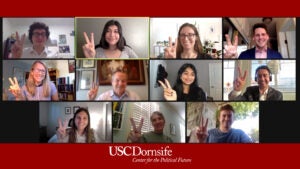Spring 2021
Depolarizing America

For the spring 2021 semester, our POSC 395 Policy Research Internship students researched how to depolarize American politics at a time when our country seems deeply divided. This project required students to take a comprehensive look at the root causes of major political differences in America. The research group also had the opportunity to extensively poll their USC peers to learn what the community thought about political polarization. They presented their extensive research and policy recommendations for best practices in the future to our partner, Civic Health Project.
Anishka Sama, a sophomore majoring in Political Science and minoring in Business, said this about her research experience, “This semester I worked as a research intern for the Civic Health Project. Our research focused on the toxic political polarization which is a growing issue in America today. Conducting this research and working with the Civic Health Project was an extremely rewarding experience. It taught me a lot about why people are so reluctant to bridge the partisan gap and what structural and societal changes need to be made to encourage people to solve polarization. I am extremely grateful for this opportunity and look forward to working on similar projects in the future.”
Project: Depolarizing America
USC Students: Maximilian Engel, Quincy Hirt, and Anishka Sama
Research Question: What unifies individuals who have the lowest propensity to bridge the partisan gap and what barriers keep them from bridging?
Research Hypothesis: Individuals with a low propensity to bridge have less of a desire to work with the opposing political party and lack the incentive to bridge the partisan divide.
Policy Recommendations:
- Create more civics-based apps like Activote and Voting Smarter.
- Increase university resources for promoting voting resources and information on how to combat polarization.
- Promote bipartisan fact-checking apps for news outlets.
- Implement electoral reforms like proportional representation and mandatory voting.
- Ban partisan gerrymandering and enact open primaries nationwide.
- Bring back weekly bipartisan Senate meetings.
Read the group’s full research presentation.
Watch the video presentation on Depolarizing America.